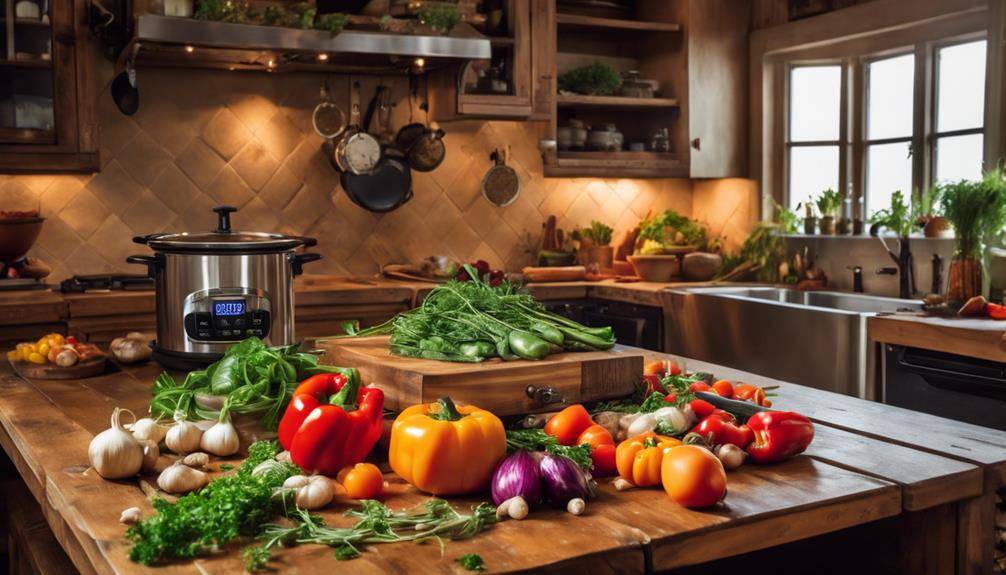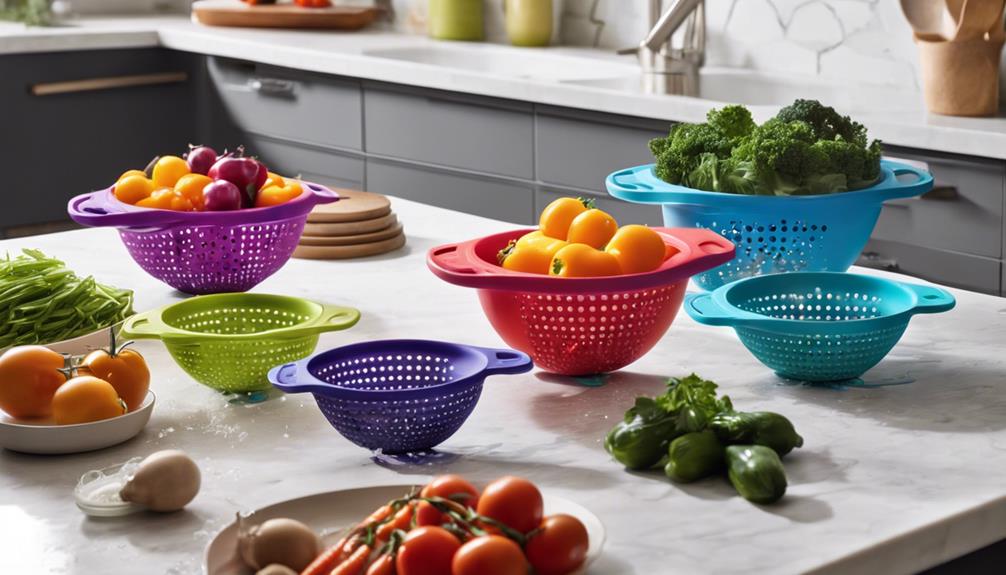The Best Rolling Pins For Baking

When you’re looking for the Best Rolling Pins For Baking, consider your needs and preferences. Wooden rolling pins offer traditional durability, while marble pins maintain coolness for delicate pastries. Silicone options are great for sticky doughs, providing a non-stick surface for easy use. Stainless steel pins are highly durable and easy to clean, making them a long-term investment. For versatility, adjustable rolling pins let you customize thickness to suit various recipes. Each type has its perks, so take your time choosing the right one for you. Explore these options to find the perfect match for your baking endeavors!
Types of Rolling Pins
When it comes to rolling pins, you’ll find a variety of types designed to suit different baking needs. Each type offers unique benefits that can enhance your baking experience. One popular option is the ceramic rolling pin. These pins are often heavier, which allows you to exert more pressure when rolling out dough. The smooth surface of ceramic makes it easy to clean and prevents sticking, allowing you to work with delicate doughs without fear of tearing. Plus, their aesthetic appeal can add a touch of elegance to your kitchen.
Another fantastic choice is the non-stick rolling pin. If you’re looking for convenience, this might be the best option for you. Non-stick rolling pins are typically made from materials like silicone or coated with a non-stick surface, making them perfect for rolling out sticky doughs like cookie or pastry dough. You won’t have to worry as much about flouring your surface too much, which can make your dough dry out.
Both ceramic and non-stick rolling pins have their advantages, depending on your baking style. If you often work with thicker doughs or want something durable, a ceramic rolling pin could be your go-to. On the other hand, if ease of use and minimal cleanup are priorities, a non-stick rolling pin might be the way to go. No matter which type you choose, having the right rolling pin can make all the difference in achieving the perfect crust or dough consistency for your favorite recipes.
Wooden Rolling Pins
When it comes to baking, wooden rolling pins are a favorite for many home cooks. You’ll find various types that cater to different doughs, each with unique benefits. Plus, knowing how to care for your wooden pin will keep it in great shape for years to come.
Types of Wooden Rolling Pins
Wooden rolling pins come in various types, each designed to enhance your baking experience. You’ll find that different wood types impact not only the durability but also the weight and feel of the pin. For instance, maple rolling pins are popular for their sturdiness and resistance to warping, while beechwood offers a smooth surface ideal for rolling dough.
When it comes to rolling pin shapes, you have options like the classic cylindrical type and the French rolling pin, which tapers at both ends for better control. Each shape serves a unique purpose: the cylindrical pin is great for general use, while the French style allows for precision when working with delicate doughs.
If you prefer a more traditional feel, consider opting for a tapered pin, as it gives you the ability to apply even pressure without excessive effort. Regardless of your choice, understanding the different wood types and rolling pin shapes will help you select the perfect tool for your baking adventures. Experiment with various types to discover which works best for your favorite recipes!
Care and Maintenance Tips
Choosing the right wooden rolling pin is just the beginning; proper care and maintenance are key to guaranteeing its longevity and performance. To keep your rolling pin in top shape, start with effective cleaning techniques. After each use, wipe it down with a damp cloth to remove any flour or dough. Avoid soaking it in water, as excessive moisture can warp the wood. If you need a deeper clean, use mild soap and warm water, then dry it immediately.
Next, consider your storage solutions. Store your rolling pin in a dry place, away from direct sunlight and humidity. A dedicated drawer or a hanging rack works well. If you’re stacking it among other kitchen tools, use a cloth or protective sleeve to prevent scratches.
Lastly, regularly condition your rolling pin with food-safe mineral oil. This will help maintain its finish and prevent cracking. Just apply a thin layer, let it soak in, and wipe off the excess. Following these care tips will not only enhance the performance of your wooden rolling pin but also guarantee it remains a cherished tool in your kitchen for years to come.
Marble Rolling Pins
Marble rolling pins are often favored by bakers for their elegant appearance and superior performance. They not only elevate your kitchen aesthetic but also provide several marble benefits that can enhance your baking experience. The cool surface of a marble rolling pin helps keep your dough at the ideal temperature, preventing it from becoming too sticky. This is particularly beneficial when working with delicate pastries or doughs that require precision, like puff pastry or pie crusts.
When it comes to marble maintenance, you’ll be glad to know that caring for your marble rolling pin is relatively simple. After each use, just wipe it down with a damp cloth and mild soap to remove any residue. Avoid soaking it in water, as prolonged exposure can cause damage. It’s also a good idea to periodically apply mineral oil to maintain its luster and prevent it from absorbing odors or stains.
One of the standout features of marble rolling pins is their weight. The heft allows you to roll out dough with minimal effort, providing excellent leverage and control. Plus, the smooth surface guarantees even pressure across your dough, resulting in a perfect thickness every time.
Silicone Rolling Pins
Rolling out dough with a silicone rolling pin makes the process easier and more enjoyable for bakers of all skill levels. One of the standout silicone advantages is its non-stick surface. You’ll find that dough won’t cling as much, which means less flour dusting and a cleaner workspace. This feature is especially helpful when working with sticky doughs like fondant or cookie dough, allowing you to roll out your creations effortlessly.
Another key benefit is silicone durability. Unlike wooden or marble rolling pins, silicone pins are less likely to crack or break over time. They can withstand high temperatures and are generally dishwasher safe, making cleanup a breeze. This durability means you won’t have to replace your rolling pin as often, saving you money in the long run.
Additionally, silicone rolling pins come in various sizes and styles, so you can choose one that fits your baking needs perfectly. Some even have measurements printed on them, helping you achieve that perfect thickness for your dough. When you’re working with different types of dough, having a reliable tool can make all the difference in your baking experience.
Stainless Steel Rolling Pins
Stainless steel rolling pins offer a range of benefits, including durability and a non-porous surface that prevents sticking. You’ll appreciate how easy they are to clean and maintain, making them a great choice for any baker. Let’s explore how to care for your stainless steel rolling pin to keep it in top shape.
Benefits of Stainless Steel
When it comes to baking, choosing the right tools can make all the difference, and stainless steel rolling pins stand out for several reasons. One of the main benefits is their durability. Unlike wood or plastic, stainless steel won’t warp, crack, or absorb odors, so you can count on it to last through countless baking adventures. This durability means you won’t have to replace your rolling pin frequently, saving you money in the long run.
Another advantage is heat conductivity. Stainless steel can help keep your dough cool while rolling, which is especially important for sensitive recipes like pastry or cookies. When you use a stainless steel rolling pin, you won’t have to worry about the heat from your hands warming up the dough, leading to better texture and flavor in your baked goods.
Additionally, stainless steel is easy to clean, which means you can spend more time enjoying your baked creations rather than scrubbing your tools. Overall, the combination of durability benefits and excellent heat conductivity makes stainless steel rolling pins a smart choice for any home baker. You’ll definitely appreciate the difference they bring to your kitchen.
Care and Maintenance Tips
Proper care and maintenance can greatly extend the life of your stainless steel rolling pin. To keep it in top shape, always clean it right after use. You can simply wipe it down with a damp cloth to remove flour and dough residue. For more stubborn spots, use mild soap and warm water. Avoid soaking your rolling pin, as this can lead to rusting. Once cleaned, dry it thoroughly with a towel.
When it comes to storage solutions, consider keeping your rolling pin in a designated drawer or on a countertop where it won’t get knocked around. If you’re short on space, you can hang it up or store it vertically in a container. To prevent scratches, avoid stacking other kitchen tools directly on top of it.
Regularly check for any signs of wear or rust, and if you notice any, treat the surface with a food-safe mineral oil to keep it protected. By following these cleaning techniques and storage tips, you’ll guarantee your stainless steel rolling pin remains a reliable tool in your baking arsenal for years to come.
Adjustable Rolling Pins
Adjustable rolling pins make it easy for you to achieve that perfect dough thickness every time. With their innovative design, these rolling pins allow you to customize the thickness of your dough simply by adjusting the end caps or rings. You’ll find that this feature is particularly beneficial when you’re baking a variety of items, as different recipes often call for different thicknesses.
An adjustable rolling pin often comes with multiple settings, enabling you to roll out dough for cookies, pie crusts, or pizza bases with ease. Instead of guessing or measuring, you can quickly switch between thicknesses, guaranteeing consistent results. This can save you time and frustration, especially during busy baking sessions.
In addition to their adjustable thickness feature, many adjustable rolling pins are designed with ergonomics in mind. An ergonomic design guarantees that the pin feels comfortable in your hands, minimizing strain during use. This is particularly important for longer baking sessions when you might be rolling out multiple batches of dough.
When choosing an adjustable rolling pin, look for one that has a sturdy construction and smooth rolling surface. This will help you achieve an even roll without sticking, making your baking experience much more enjoyable. Whether you’re a beginner or a seasoned baker, an adjustable rolling pin is a valuable addition to your kitchen tools, helping you create perfect pastries and baked goods every time.
Specialty Rolling Pins
Specialty rolling pins are essential tools for bakers looking to elevate their creations with unique designs and functionalities. These pins go beyond the traditional cylindrical shape to offer a variety of decorative patterns and unique textures that can transform your baked goods into stunning works of art.
When you roll out dough with a specialty pin, you can achieve intricate designs that enhance the visual appeal of cookies, pastries, and fondants. For instance, a patterned rolling pin can imprint designs directly onto your dough, saving you time while creating beautiful results. Imagine the delight of your guests when they see cookies adorned with floral motifs or geometric shapes, all thanks to your specialty rolling pin.
You might also consider using textured rolling pins, which create a lovely surface on your dough that can hold icing or toppings better. These pins often feature raised designs that add depth to your creations, giving them a professional touch. They’re perfect for adding a rustic charm to pies and tarts or for creating stunning backgrounds for cakes.
Don’t forget that specialty rolling pins come in various materials, including wood, silicone, and even marble. Each material offers different benefits, so you can choose one that suits your baking style. By incorporating a specialty rolling pin into your baking toolkit, you’ll not only save time but also impress your family and friends with the beautiful designs you create.
Care and Maintenance Tips
Taking care of your rolling pins guarantees they last for years and maintain their performance. Start with proper cleaning techniques. For wooden rolling pins, avoid soaking them in water, as this can cause warping. Instead, wipe them down with a damp cloth after each use. If you need a deeper clean, use a mixture of mild soap and water, then dry thoroughly. For silicone or marble rolling pins, simply wash them with warm, soapy water and let them air dry.
Next, consider your storage solutions. Store your rolling pins in a dry place, away from extreme temperatures and humidity, which can damage the material. If you have multiple rolling pins, consider hanging them on a rack or placing them in a designated drawer. This prevents them from rolling around and getting damaged.
You might also want to apply a food-safe mineral oil to wooden rolling pins every few months to keep the wood moisturized and prevent cracking. For silicone pins, regular cleaning is usually enough, but check for any signs of wear and replace them if necessary.
Lastly, always handle your rolling pins gently. Avoid dropping them or using excessive force when rolling dough. By following these care and maintenance tips, you’ll guarantee your rolling pins remain reliable tools in your baking arsenal for years to come. Happy baking!
Frequently Asked Questions: Best Rolling Pins For Baking
What Is the Ideal Weight for a Rolling Pin?
The ideal weight for a rolling pin varies, but it should feel comfortable in your hands. Consider rolling pin sizes and ideal materials like wood or marble, which provide the right balance and control for your baking tasks.
Can I Use a Rolling Pin for Non-Baking Tasks?
Absolutely, you can use a rolling pin for non-baking tasks! It’s a versatile kitchen tool that enhances various cooking techniques, like flattening dough for dumplings or crushing crackers for a recipe. Get creative in the kitchen!
How Do I Store My Rolling Pin Properly?
To store your rolling pin properly, keep it in a clean, dry place. Use wooden storage to prevent damage, and if it’s silicone, follow care instructions to maintain its condition and longevity.
Are There Rolling Pins Specifically for Dough Types?
Yes, there are rolling pins designed for specific dough types. Material differences, like wood or marble, affect how they handle moisture and temperature, so choose a pin that complements the dough you’re working with.
Do Rolling Pins Come With a Warranty or Guarantee?
Rolling pins often come with warranty options, but it varies by brand and materials. Check the product details for specifics. Some materials may offer longer warranties, so consider that when choosing your rolling pin.
Conclusion
To sum up, choosing the right rolling pin can make all the difference in your baking experience. Whether you prefer the classic feel of a wooden pin, the cool touch of marble, or the versatility of silicone, there’s a perfect option for you. Don’t forget to take into account adjustable or specialty pins for added convenience. With proper care and maintenance, your rolling pin will serve you well for years to come, helping you create delicious baked goods with ease.








